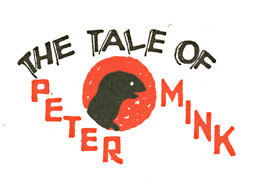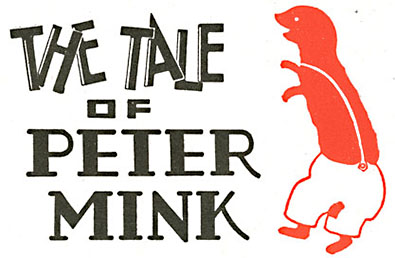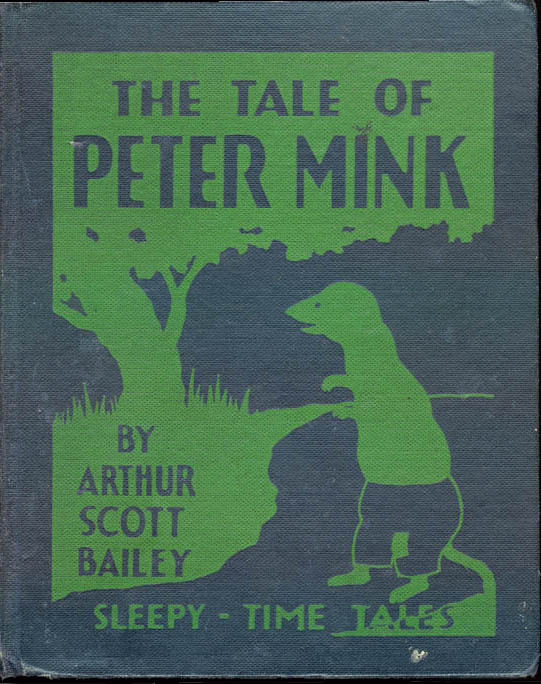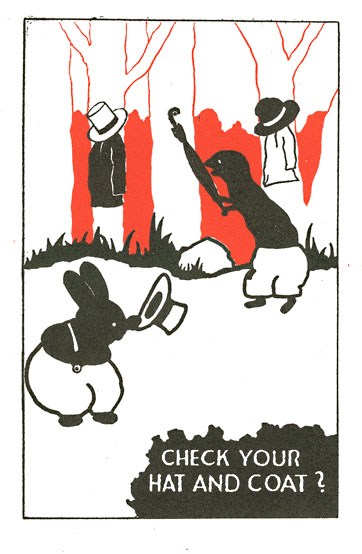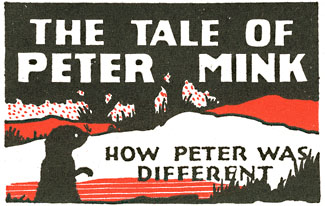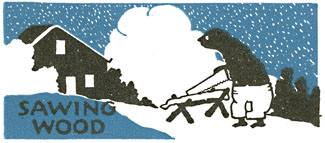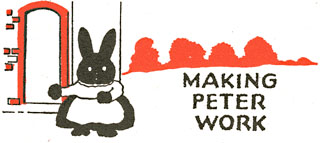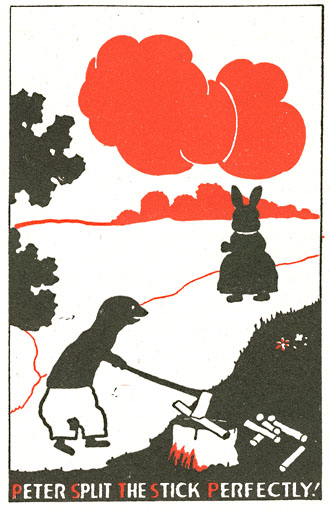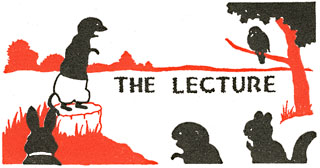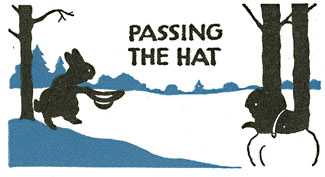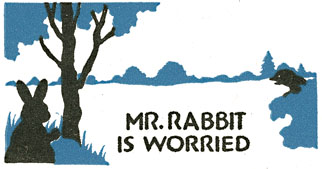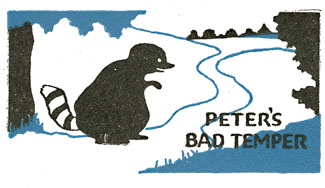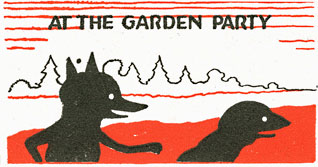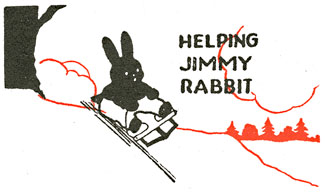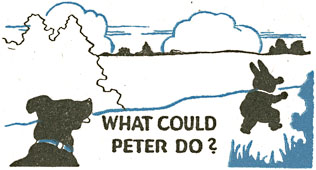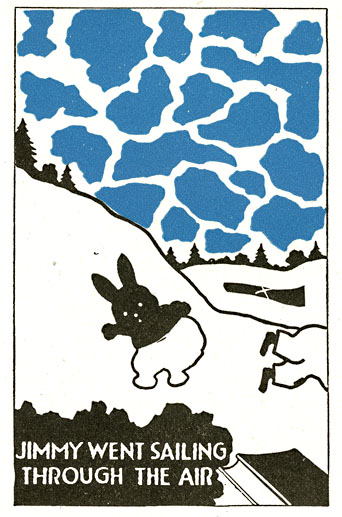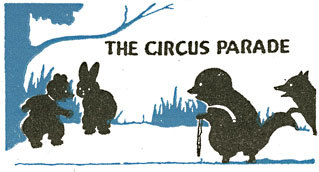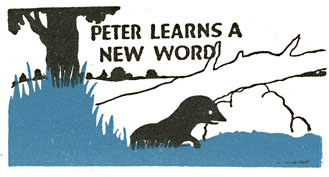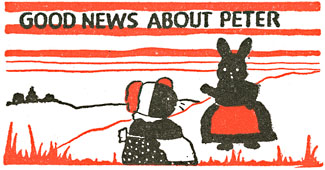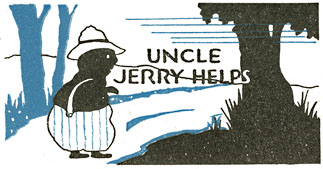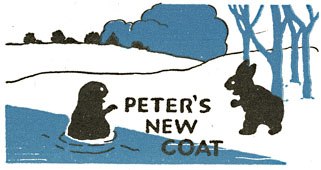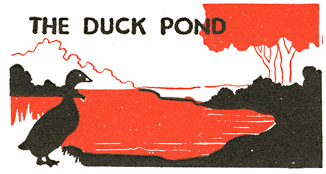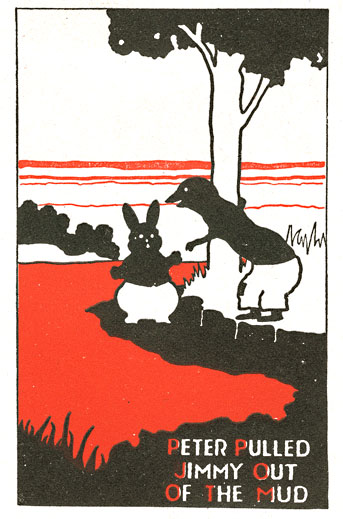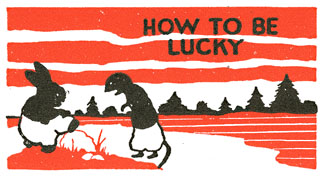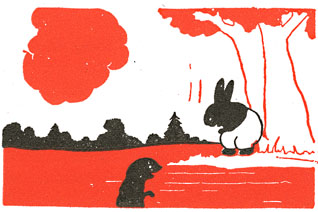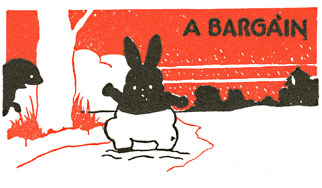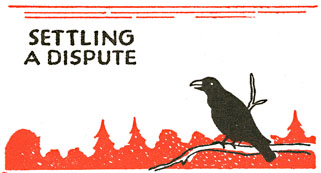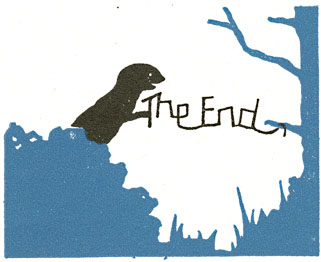The Project Gutenberg EBook of The Tale of Peter Mink, by Arthur Scott Bailey
This eBook is for the use of anyone anywhere at no cost and with
almost no restrictions whatsoever. You may copy it, give it away or
re-use it under the terms of the Project Gutenberg License included
with this eBook or online at www.gutenberg.org
Title: The Tale of Peter Mink
Sleepy-Time Tales
Author: Arthur Scott Bailey
Illustrator: Joseph Guzie
Release Date: June 16, 2007 [EBook #21845]
Language: English
Character set encoding: ISO-8859-1
*** START OF THIS PROJECT GUTENBERG EBOOK THE TALE OF PETER MINK ***
Produced by Joe Longo and the Online Distributed
Proofreading Team at http://www.pgdp.net
|
|
|
BY
ARTHUR SCOTT BAILEY
AUTHOR OF
THE CUFFY BEAR STORIES
SLEEPY-TIME TALES, ETC.
Illustrations by
Joseph B. Guzie
GROSSET & DUNLAP
PUBLISHERS NEW YORK
|
Copyright, 1916, by
GROSSET & DUNLAP
CONTENTS
| CHAPTER | |
PAGE |
| I | How Peter Was Different | 9 |
| II | Sawing Wood | 13 |
| III | Making Peter Work | 19 |
| IV | The Lecture | 25 |
| V | Passing the Hat | 31 |
| VI | Mr. Rabbit Is Worried | 38 |
| VII | Peter's Bad Temper | 43 |
| VIII | At the Garden-Party | 48 |
| IX | Helping Jimmy Rabbit | 53 |
| X | What Could Peter Do? | 59 |
| XI | The Circus Parade | 64 |
| XII | Peter Learns a New Word | 69 |
| XIII | Good News About Peter | 75 |
| XIV | Uncle Jerry Helps | 80 |
| XV | Peter's New Coat | 85 |
| XVI | The Duck Pond | 90 |
| XVII | How To Be Lucky | 96 |
| XVIII | The Bargain | 101 |
| XIX | Settling a Dispute | 107 |
ILLUSTRATIONS
| CHECK YOUR HAT AND COAT? |
Frontispiece |
| PETER SPLIT THE STICK PERFECTLY! | 22 |
| JIMMY WENT SAILING THROUGH THE AIR | 62 |
| PETER PULLED JIMMY OUT OF THE MUD | 90 |
p. 9
There were two ways in which Peter
Mink was different from any other person
in Pleasant Valley, or on Blue Mountain,
either. In the first place, he had no home;
and in the second, he had a very long neck.
The reason why Peter had no home was
because he didn't want one. And the reason
why he had such a long neck was because
he couldn't help it.
When he grew sleepy he would crawl
p. 10into any snug place he happened to find—sometimes
in a hollow stump, or in a pile
of rocks, or a haystack. And often he
even drove a muskrat out of his house, so
he could sleep there.
Most of the time Peter Mink went about
in rags and tatters. Whenever he did
have a new suit (which wasn't often) it
never looked well for long. Naturally,
sleeping in all sorts of places did not improve
it. But what specially wore out his
clothes was the way he was always squeezing
through small holes and cracks.
Wherever Peter saw a narrow place he
never could resist trying to get through it.
He was a long, slim fellow, with a small,
snake-like head. And he always knew that
if he could squeeze his head through a
crack he could get his body through it, too.
It is not at all strange that Mrs. Rabbit
and Mrs. Squirrel and Mrs. Woodchuck—as
well as a good many other people—didp. 11
not care to have their sons in Peter Mink's
company. They said that any one who
went about looking as untidy as he did,
and without a home, was not likely to set
a good example to the young.
But Jimmy Rabbit and Frisky Squirrel
and Billy Woodchuck loved to be with
Peter Mink. To be sure, he was quarrelsome.
And he was always ready to fight
any one four times as big as he was. So
they had to be careful not to offend him.
But in spite of that, they found him interesting—he
was such a fine swimmer. He
could swim under water just as well as he
could swim with his head above the surface.
And in winter he was not afraid to
swim under the ice in Broad Brook.
There was another thing about Peter
Mink that made the younger forest people
admire him. He was a famous fisherman.
He could dive for a trout and catch himp. 12
too, just as likely as not. And there was
nothing more exciting than to see Peter
Mink pull an eel out of the water.
It is really a great pity that he was so
rough. But you see, he left home at an
early age and grew up without having any
one to tell him what he ought—and ought
not—to do. No doubt he didn't know the
difference between right and wrong. Jimmy
Rabbit's mother used to call him "the
Pest." She often remarked that she
wished Peter would leave the neighborhood
and never come back.
I am sure that Johnnie Green's father
would have agreed with her, because
Peter Mink was too fond of ducks to suit
Farmer Green. Of course, Peter didn't
care to eat ducks all the time. Sometimes
he dined on a fat hen. But even then
Farmer Green was angry. No doubt
Peter Mink thought him hard to please.
p. 13
It was really no wonder that Mrs. Rabbit
did not like Peter Mink. When you hear
what happened the very first time she saw
him you will understand why Mrs. Rabbit
always called him "the Pest."
One day Mrs. Rabbit heard a knock on
her door. And when she went to see who
was there, she found a ragged young fellow,
with his hat tipped far over on one
side. Instead of a collar, he wore a handkerchief
about his neck. But it would
have taken at least a dozen handkerchiefs,
tied one above another, to cover
the stranger's neck; for it was by far thep. 14
longest neck Mrs. Rabbit had ever seen.
"What do you want?" Mrs. Rabbit
asked.
"Something to eat!" said the stranger.
You notice that he didn't say "Please!"
That was a word that Peter Mink had
never used. Probably he didn't even know
what it meant.
Now, Mrs. Rabbit saw that the stranger
was very thin. She did not know that no
matter how much he ate, he would never
be what you might call fat. That slimness
was something that ran in Peter Mink's
family. The Minks were always slender
people.
Being a kind-hearted soul, Mrs. Rabbit
went back to her kitchen. And soon
she brought Peter a plateful of the best
food she had.
"You're not ill, are you?" she asked
Peter.
p. 15
"No!" he answered, as he took the dish.
"Then," said Mrs. Rabbit, "I shall expect
you to do some work, to pay for this
food."
"All right!" said Peter. But he wished
that he had said he was ill. For he simply
hated work. And he made it a rule never
to do a stroke of work if he could avoid it.
Well, he sat down on Mrs. Rabbit's
doorstep and ate what she had given him.
And while he was eating, Jimmy Rabbit
came out and watched him. Even Jimmy
Rabbit could see that he had very bad
manners. He held something to eat in each
hand. And he didn't seem to care from
which hand he ate, so long as he kept his
mouth stuffed so full that he could hardly
talk.
"What's your name?" Peter Mink
asked Jimmy. And when Jimmy told him,
he said: "No wonder you're fat, with suchp. 16
good things to eat as your mother makes."
When Mrs. Rabbit heard that she was
pleased. And for a time she thought that
perhaps the stranger was not so bad as he
looked.
When he had almost finished his lunch,
Mrs. Rabbit went back into her house once
more. And pretty soon she came out with
a saw in her hand. She gave the saw to
Peter Mink and said:
"Now you may saw some wood, to pay
me for the food. You'll find the wood-pile
behind the house. And you may saw all of
it," she added.
Peter Mink took the saw and started for
the wood-pile. And Jimmy Rabbit followed
him. Peter sawed just one stick of
wood; and then he said to Jimmy:
"Go in and ask your mother if she can't
find an old pair of shoes for me."
So Jimmy ran into the house to find hisp. 17
mother. And kind-hearted Mrs. Rabbit
began at once to hunt for a pair of shoes
to give the stranger. She had noticed that
his toes were sticking out.
Pretty soon she found some shoes which
she thought would fit the stranger. And
when she stepped to her door again, there
he was, waiting for her.
"What! Is the wood all sawed so
soon?" asked Mrs. Rabbit. "If it is,
you're a spry worker, young man!"
"The saw—" said Peter Mink—"the
saw is no good at all. It broke before I
finished sawing half the wood-pile." And
that was true, too, in a way; because he
had only sawed one stick.
"Well, if you've finished half of it you
haven't done badly," Mrs. Rabbit told
him. And she gave Peter Mink the shoes.
"They're not very new," he grumbled.
"But they're better than none."
p. 18
They certainly were much better than
the shoes he had been wearing.
Then Peter Mink went slouching off.
He did not even thank Mrs. Rabbit for her
kindness. He did not even take away his
old shoes, but left them on the doorstep
for Mrs. Rabbit to pick up.
"I must say that young man has had no
bringing up at all," she told Jimmy. "I
hope this is the last we'll see of him....
Come!" she said. "Help me bring in some
of the wood he sawed."
Well, Mrs. Rabbit was surprised when
she found that the stranger had sawed
only one stick.
When Mr. Rabbit came home he took
just one look at his broken saw. And he
was more than surprised. He was angry.
"Why," he said, "I do believe that
good-for-nothing rascal broke my saw on
purpose, so he wouldn't have to work."
p. 19
Peter Mink waited several days before
he knocked at Mrs. Rabbit's door again.
And when he did at last come back, he first
made sure that her husband was not at
home. You see, Peter had heard that Mr.
Rabbit had told some of the forest-people
that Peter had broken his saw, so he
wouldn't have to saw wood to pay for the
food that Mrs. Rabbit gave him.
When Mrs. Rabbit saw who it was that
knocked, she came very near shutting the
door in Peter's face. But she couldn't
help noticing again how thin Peter was.
And when he asked again for something top. 20
eat she hadn't the heart to refuse him.
"You're not ill, are you?" she asked.
"Well—yes, I am!" said Peter Mink,
boldly. He would actually rather tell a lie
than work. And he thought that if he said
he was ill, Mrs. Rabbit wouldn't expect
him to do any work to pay for what she
might give him.
"You look to me as if you needed some
cambric tea," Mrs. Rabbit said.
Now, if there was anything that Peter
Mink disliked, it was cambric tea. If she
had said "chicken broth," he might have
liked that.
"I've been very ill," he said. "But now
the doctor tells me I must have good, nourishing
food—and plenty of it."
"Well, if you're well enough to eat,
you're well enough to work," said Mrs.
Rabbit.
"Oh, certainly!" answered Peter.
p. 21
Mrs. Rabbit went into the house then.
And when she came out again Peter Mink
was surprised at what she brought. He
had expected another plateful of goodies.
But instead of that, Mrs. Rabbit had an
axe in her hand.
"Here!" she said. "Take this out to the
wood-pile—and use it! I want you to split
every stick of wood you can find. Then
knock on the door again and I'll bring you
something to eat."
You ought to have seen Peter Mink
scowl, as he walked away to the wood-pile
with the axe on his shoulder. It was a lesson
to anybody, never to frown!
"She needn't think she can make me
work!" Peter said to himself. "I'll just
break her old axe—that's what I'll do!"
And he swung the axe with all his might
at a stick of wood.
But the axe didn't break. And as forp. 22
the stick, it fell in two pieces; for Peter
had split it perfectly.
He was so out of patience that he aimed
a hard blow at another stick of wood.
Again, he didn't hurt the axe at all. And
again he split the wood exactly as Mrs.
Rabbit wanted him to. But Peter never
thought of that.
Peter Mink scowled even worse than
ever. And he made up his mind that he
would break Mrs. Rabbit's axe if he had
to use up the whole wood-pile to do it.
Well, that is just what happened. Peter
tried so hard to break the axe so he
wouldn't have to work, that before he
knew it he had split all the wood.
He was just about to look for a rock,
then—on which to break the axe—when
he happened to think that there was no
longer any sense in trying to do that, because
the work was all done!
p. 23
So he put the axe across his shoulder
and went and knocked on Mrs. Rabbit's
door.
"Bring on your food!" he said, when
Mrs. Rabbit appeared.
"Is the axe all right?" she asked. "It
didn't break, did it?"
"No, indeed!" he said—"though I
was rather expecting it would."
"Is the wood all split?" she inquired.
"Every stick of it!" answered Peter.
"Then bring it here, near the back
door," Mrs. Rabbit told him. "That will
help pay for the saw you broke here last
week."
"I'll do nothing of the kind!" said
Peter Mink. And he was so angry that
he went back to the wood-pile and began
throwing sticks of wood at Mrs. Rabbit's
house, trying to break a window. And
before he knew it he had thrown the wholep. 24
wood-pile in almost the exact spot where
Mrs. Rabbit wanted it. And he hadn't
broken a single window, either.
But Peter Mink never once realized
what he had done. He went off to take a
swim in the brook, and maybe catch a
trout.
Later when Mrs. Rabbit saw that in
spite of what Peter had said, he had
moved her wood-pile for her, she wondered
why he had not asked for something to
eat. But Peter Mink never knocked on
her door again. He kept away from Mrs.
Rabbit ever afterward, because she was
the only person who had ever been able to
make him work.
p. 25
Peter Mink was going to give a lecture.
He had invited everybody.
"It's something you all ought to hear,"
he said. "And it will cost you nothing to
come. Another time," he explained,
"whoever hears my lecture will have to
pay. But this one is free."
Old Mr. Crow remarked that he supposed
Peter Mink was going to tell people
how to catch ducks. And since he never
cared anything at all about ducks, he said
he didn't expect to be present.
"I'm glad you're not coming," Peter
Mink answered, "because I'm afraid therep. 26
won't be room for all the people who intend
to hear me. As for ducks—I'd no
more think of giving a lecture about ducks
than I would about crows."
Old Mr. Crow pretended not to hear
what Peter said. He did not care even to
be seen talking with such a worthless fellow.
But there were many other people living
in Pleasant Valley and on Blue Mountain
who decided to go to Peter Mink's lecture—when
they learned that they might get
in free.
And when the night of the lecture arrived
even Peter himself was surprised to
see how many were present.
To be sure, Peter noticed that some of
the audience were smiling; and some of
them were nudging one another, as if they
thought the whole thing was nothing but
a joke. And when the full moon climbedp. 27
over the top of Blue Mountain, and Peter
Mink climbed on top of an old stump and
faced the gathering, a few rude persons
laughed aloud.
"What about ducks?" somebody called
from a tree above Peter's head. Everybody
tittered at that, because everybody
knew that Peter was very fond of ducks
and spent much of his time at Farmer
Green's duck pond.
It was old Mr. Crow who asked that
question. He had come to the lecture, in
spite of what he had said.
"My lecture," Peter Mink began, when
all was quiet, "my lecture to-night is going
to be about a poor boy who has no one
to take care of him. He has no home.
And very often he goes about in rags.
Sometimes he begs for food and clothes.
I think," Peter said, "we all ought to be
very sorry for him."
p. 28
As soon as Peter said that, Mrs. Squirrel
and Mrs. Woodchuck took out their
pocket-handkerchiefs and wiped their
eyes. And Mrs. Squirrel's husband was
heard to remark that it was a shame, and
that he thought something ought to be
done.
Well, Peter Mink went on and told them
as many as twenty-three different tales
about that poor boy, to show them what a
hard life he led. Every tale was sadder
than the one just before it. And by the
time Peter had finished the twenty-third,
there were very few dry eyes in the place.
And Mr. Squirrel spoke up loudly and
said once more that something ought to be
done about it.
When he said that, Uncle Jerry Chuck
rose hurriedly and hobbled away from the
lecture. He had sat in one of the best
seats, because it was free. And he hadp. 29
wept quite noisily, once or twice, because
it cost no more to weep and he wanted all
he could get for nothing. But when Mr.
Squirrel said what he did, Uncle Jerry at
once thought of a collection. And he decided
that he had better leave before it was
too late.
Peter Mink saw him go. And here and
there he noticed other people who looked
as if they would like to leave, too. And he
knew that there was no time to lose.
"I see one gentleman leaving," Peter
Mink said in a loud voice. "I hope no
more will go—unless, of course, they're so
stingy that they wouldn't care to give a
little something to help this poor boy I've
been telling you about."
After that, nobody wanted to leave, because
nobody wanted to be thought stingy.
"I appoint Mr. Rabbit and Mr. Woodchuck
to take up a collection for this poorp. 30
boy," Peter Mink said. "And I've no
doubt that they will be glad to give all they
can, themselves."
Mr. Rabbit and Mr. Woodchuck saw
that everybody was looking at them. And
they at once emptied their pocket-books
into their hats.
"What's his name? What's the poor
boy's name?" a hoarse voice called. It
was Mr. Crow who asked the question.
"That," said Peter Mink, "is something
I do not care to tell to everybody."
And many people clapped their hands.
They were beginning to have a better opinion
of Peter Mink.
But old Mr. Crow only laughed loudly
from his perch in the tree.
p. 31
After giving all they happened to have in
their pocket-books, Mr. Rabbit and Mr.
Woodchuck began to pass their hats to
take up the collection for the poor boy that
Peter Mink had been telling them about.
And all the people who had come to hear
Peter's lecture began to dig down into
their pockets.
"That's right!" Peter cried. "Give
what you can! Of course, I don't expect
the poor people to give as much as the
rich."
That made everybody decide that he
would give all he had with him. And manyp. 32
people wished they had brought more. Besides,
no one wanted to be thought stingy,
like Uncle Jerry Chuck, who had hurried
away as soon as he suspected that there
was going to be a collection.
When Mr. Rabbit and Mr. Woodchuck
had passed their hats to every person present,
their hats were filled to the brim. And
they marched proudly up to the stump
where Peter Mink still stood.
Peter jumped down to the ground.
"Keep your seats, everybody!" he
called. "The next thing to be done is to
count this money. And I will do that myself."
So Peter picked up the two hats
and started away.
"Where are you going?" Mr. Rabbit
asked him.
"Just a little way into the woods," said
Peter. "It's so noisy here, with all this
talking, that I might make a mistake."
p. 33
"We'll go with you and help you," Mr.
Rabbit told him.
"Oh, you don't need to do that," said
Peter Mink.
But Mr. Rabbit insisted.
"One of those hats is mine," he remarked.
"And wherever it goes, I go,
too," And he beckoned to Mr. Woodchuck
to follow.
Well, Peter Mink didn't like that very
well. You see, he had planned to go into
the woods alone with the money. And nobody
likes to have his plans upset. But
there was nothing he could say. So they
all three went into a thicket of elderberry
bushes and counted the money.
"I thought there was more," Peter said.
"Maybe we dropped some of the money.
You and Mr. Woodchuck had better go
back and see if you can find any," he told
Mr. Rabbit.
p. 34
But Mr. Rabbit said that they could just
as well all go back together and search
along the ground as they went.
"All right!" said Peter Mink. "Well
leave these hatfuls right here for a while."
But Mr. Rabbit said he didn't think that
would be a safe thing to do. So he picked
up one hatful, and told Mr. Woodchuck
to carry the other.
Peter Mink didn't like that at all. But
there was nothing he could say. So they
all went back together to the place where
the rest of the people were still waiting.
And they found no more money, either.
Mr. Rabbit jumped up on the stump
where Peter had stood and talked.
"The question is," he said, "who is going
to take charge of all this money?"
"I am!" said Peter Mink.
But Mr. Rabbit said he didn't think that
would be safe.
p. 35
"You have no home, you know," he told
Peter. "And you can't very well carry
the money about with you. I must have
my hat back; and no doubt Mr. Woodchuck
will want his, too."
Mr. Woodchuck nodded his head. He
certainly did want his hat. It was the best
one he had.
"I would suggest—" said Mr. Rabbit
then—"I would suggest that I take one
hatful home with me, and that Mr. Woodchuck
take the other to his house. Then
we'll each have our hats; and the money
will be perfectly safe."
"That's a good idea!" Peter Mink said.
"The only trouble with it is that it won't
do at all. For you and Mr. Woodchuck
don't know the poor boy. So how could
you ever give him the money?"
Everybody said that was so.
"This Peter Mink is certainly a brightp. 36
young fellow," people told one another.
Mr. Rabbit looked puzzled.
"What do you suggest, then?" he asked
Peter.
Peter Mink smiled. He seemed pleased,
for one reason or another.
"This stump," he said, "is hollow. As
you can all see, there's a small hole in it.
We can put the money in there and nobody
can get it out. It will be the same as
in a bank."
Mr. Rabbit looked at the hole in the
stump.
"I know I can't get through that hole,"
he said. "But what about you, young fellow?"
he asked Peter.
"Oh, I can't squeeze through such a
small hole as this," said Peter. "See!"
He pushed his nose part way through the
hole. And there his head seemed to stick.
He could have squirmed through if he hadp. 37
really tried. But nobody else seemed to
know it.
"But how is the poor boy ever going to
get his money?" Mr. Rabbit inquired.
"Oh, he's very slim," Peter Mink said.
"He can get inside the stump. Don't you
worry about him!"
Everybody seemed satisfied. So they
dropped the money through the hole.
And then Mr. Rabbit said:
"When are you going to bring the poor
boy to get the money?"
"To-morrow night would be a good
time," Peter Mink said. "Would you all
like to come here to-morrow night at this
same hour?"
And everybody said, "Yes!"
p. 38
When Mr. Rabbit reached home, after
Peter Mink's lecture, and told his wife
about the money that had been collected
for the poor boy whom Peter Mink knew,
she asked:
"Who has the money?"
"Oh, it's safe," said Mr. Rabbit. "It's
hidden in an old stump. And the hole in
the stump is so small that even Peter himself
can't crawl through it."
"How do you know he can't?"
"He tried," said Mr. Rabbit.
"How do you know he tried as hard as
he could?" Mrs. Rabbit asked.
p. 39
That was what made Mr. Rabbit worry.
So instead of going to bed, he hurried back
to the place where Peter had given his famous
lecture; and there he hid himself
under a small pine.
Mr. Rabbit hadn't waited long before
he saw some one come out of the elderberry
bushes and hurry up to the stump.
It was Peter Mink! He had a bag in his
hand. And while Mr. Rabbit was watching,
he squeezed through the hole in the
stump. Even for Peter Mink the hole was
almost too small. But he managed to
squirm through, though it cost him a few
groans; and he said some words that made
Mr. Rabbit shake his head.
Well, as soon as Peter was inside the
hole he began to push the money through
it. And then what do you suppose Mr.
Rabbit did? He crept up to the stump,
picked up the bag, which Peter had leftp. 40
on the ground, and as fast as the money
rolled out of the hole, Mr. Rabbit put it
inside the bag.
The bag was almost full when the money
stopped rolling out of the hole. And Mr.
Rabbit heard Peter Mink say to himself:
"That seems to be all!"
And as soon as he heard that, Mr. Rabbit
hurried away, with the bag of money
over his shoulder.
Peter Mink waited a bit, to see if he
could find more money. But he had
thrown it all out. So he squeezed through
the hole again. Then he turned to pick
up the bag. But it had vanished.
"That's queer!" said Peter Mink. "I
thought I left that bag right here." He
looked all around, but he couldn't find it
anywhere. So he took off his ragged
coat and laid it on the ground. "I'll put
the money in this!" Peter said.
p. 41
But when he looked for the money he
couldn't find a single piece.
"That's queer!" said Peter. "It must
have rolled away from the stump." And
he began to search all about. But the
money, too, had vanished completely. And
Peter Mink couldn't understand it.
The following night, when everybody
came back again, expecting that Peter
Mink would bring the poor boy with him
to get the money, Peter never appeared
at all.
Finally Mr. Rabbit jumped on top of
the stump and told his friends what had
happened the night before.
"And now," he said, "everybody can
come right up here and get his money
back, for there's no doubt at all that Peter
Mink was collecting it for himself. He
was the poor boy he told us about."
Everybody was surprised. But everybodyp. 42
was glad to get his money again. In
fact, there was only one person who
grumbled; and that was Uncle Jerry
Chuck. He hurried up to the stump ahead
of all the rest, to get some money. And
he seemed more surprised than ever when
Mr. Rabbit said there was no money there
for him.
"I was at the lecture last night," Uncle
Jerry said.
"But you left before the money was
collected," Mr. Rabbit replied.
Uncle Jerry admitted that that was so.
But he claimed that he had made less
trouble for everybody, because no one had
been obliged to handle the money that he
hadn't given.
But Mr. Rabbit told him he ought to be
ashamed of himself. And every one will
say that Peter Mink ought to have been
ashamed of himself, too.
p. 43
Peter Mink was always quarreling. And
he seemed always ready to fight—to fight
even people who were four times bigger
than he was. And when he fought, Peter
usually won. But there was one person
Peter Mink was afraid of; and that was
Fatty Coon. Fatty was almost too big for
Peter Mink to whip. And his teeth were
very sharp. And his claws were like
thorns.
One day Peter and Fatty had a dispute.
Fatty Coon had said that a hen made the
finest meal in the world. But Peter Mink
spoke up at once and said it wasn't so.
p. 44
"There's nothing quite like a duck," he
said.
Fatty Coon sneered.
"Ducks may be all right," he cried. "In
fact, in my opinion they are far too good
for any member of the Mink family to eat.
But for me—give me a plump hen!" And
just thinking about hens made him
hungry. And being hungry made him
think of green corn. "Give me a plump
hen and plenty of green corn!" And he
looked all around, as if he expected somebody
would hurry up to him with a hen in
one hand and a dozen ears of corn in the
other.
But nobody came.
"You're a big glutton!" Peter Mink
shouted. He was very angry. But he did
not dare fight Fatty Coon.
"I guess you wish I was smaller," said
Fatty Coon, "so you could fight me."
p. 45
At that, Peter Mink looked very fierce.
And he turned to Frisky Squirrel and
Billy Woodchuck and Jimmy Rabbit and
shouted:
"Take hold of me, quick, you fellows—before
I hurt him! For I can't keep my
hands off him a second longer!"
When they heard that, Fatty's friends
were frightened. They were afraid Peter
Mink would fly at him and hurt him terribly.
So they all seized Peter and held
him fast, while they begged Fatty to run
away.
Now, Fatty Coon was not the least bit
afraid of Peter. But talking of good
things to eat had made him so hungry that
he felt he must hurry down to Farmer
Green's cornfield at once. So he said
"Good-bye!" and left them.
After Fatty had disappeared, Peter
Mink said it was safe to let him go again,p. 46
but that it was lucky they had held him.
And Frisky Squirrel and Billy Woodchuck
and Jimmy Rabbit agreed afterwards
that Peter Mink was a dangerous
fellow. They were glad that Fatty Coon
had escaped.
The next day, almost the same thing
happened again. Only this time Peter
Mink remarked that there was nothing
any tastier than a fine eel. Fatty Coon
told him that eels might be good enough
for the Mink family, but as for him, he
preferred green peas.
"Somebody hold me, quick!" Peter
Mink screamed. "I don't want to hurt
him—but I'm losing my temper fast."
Several of Fatty Coon's friends started
to seize Peter Mink, so Fatty might run
away. But there was one person present
who had not been there the day before.
This was Tommy Fox. And he onlyp. 47
laughed when Peter Mink said what he
did.
"Don't touch him!" Tommy Fox told
the others. "Let's see what he'll do.
Fatty isn't afraid of him."
"Why, certainly not!" Fatty Coon said.
And he smiled in such a way that he
showed his sharp teeth.
"Somebody stop me, before it's too
late!" Peter Mink cried.
But nobody laid a hand on him. And
still Peter did not move.
"Go ahead!" Tommy Fox urged him.
"You said you were losing your temper,
you know."
"I'm waiting!" Fatty Coon called. And
he held up both his front paws. Peter
saw how strong and sharp his claws were.
"I declare," Peter Mink said, "I haven't
lost my temper, after all. I felt it going—for
a moment. But it came back again."
p. 48
Peter Mink was angry with Tommy Fox;
for it was he who showed everybody that
Peter was afraid of Fatty Coon. Peter
Mink was so angry that he went about telling
everyone he met how he was going to
punish Tommy Fox. "When I finish with
him," he said, "he'll know enough to keep
his advice to himself."
"What are you going to do to him?"
Jimmy Rabbit inquired.
"Well, I'm going to bite his nose,"
Peter explained, "because it was his nose
that he stuck in my affairs." And Peter
went away muttering even worse thingsp. 49
to his cousin, who was with him. His
cousin's name was Slim Mink. And he
was spending the summer in Farmer
Green's haystack near the duck pond.
Slim had heard somewhere that there
was a place called the Reform School,
where boys were sent who fought too
much. And he began to be afraid that if
Peter did to Tommy Fox half the things
he said he was going to do, some one would
come along and catch Peter and send him
to the Reform School.
And the Reform School was an awful
place! Why, boys who went there had to
sleep in beds! They had to wash their
faces every morning, and brush their hair,
and have table manners! It was no wonder
that Slim began to worry.
"You'd better let that young fox alone!"
he told Peter. "You fight too much. If
you don't look out, something dreadfulp. 50
will happen to you, some day. You'll get
sent to the Reform School."
But Peter Mink told him to hold his
tongue. "If you're not careful," Peter
said, "I'll bite your nose, too."
Now, Slim was smaller than his cousin
Peter. And he didn't want his nose bitten.
So he kept quiet after that. But he
hoped that Peter would take his advice.
"Let's go down to the brook and fish,"
he suggested, hoping that he could get
Peter's mind off Tommy Fox.
"You can go if you want to," said Peter
Mink. "And save me some fish, too, or it
will be the worse for you!"
Slim decided that he wouldn't go fishing,
after all. And he roamed through the
woods with Peter, who was determined to
find Tommy Fox.
And at last Peter found him, at a garden-party
that was being given by Jimmyp. 51
Rabbit, in Farmer Green's garden.
Everybody but Tommy Fox was having
refreshments. But he said he didn't feel
like eating anything. That was because
he was polite. He never cared for lettuce,
or peas, or cabbage.
Peter Mink had not been invited to the
garden-party. But that made no difference
to him. Before anyone knew what
was happening he marched straight up to
Tommy Fox and bit him on the nose.
Then there followed such an uproar as
had never before been seen in Farmer
Green's garden. Tommy Fox and Peter
Mink rolled over and over upon the
ground. And for a long time nobody
could tell one from the other.
But after a while that squirming heap
of tails and legs began to turn more slowly,
until at last it stopped altogether.
Peter Mink was a sad sight. He hadp. 52
been ragged enough, before the fight.
But now he looked ten times worse. And
one of his eyes was closed. And he had
lost his hat, and one shoe.
Everyone was glad that the trouble was
over. And everyone was glad that Tommy
Fox had won.
And to everybody's surprise, the gladdest
of all was Slim Mink, Peter's cousin.
"Hurrah!" he cried. (The others had
been too polite to say anything.)
"What makes you shout that?" Peter
asked Slim as he crawled away.
"Why," his cousin answered, "Tommy
Fox hurt you, instead of your hurting
him. And now you won't have to go to
the Reform School."
But for once Peter Mink thought there
might be worse places than that. He
thought that maybe a real bed would feel
pretty comfortable, just then.
p. 53
Peter Mink was feeling even more peevish
than usual. And this was the reason:
Jimmy Rabbit had a new sled.
Now, Peter had never owned a sled;
and it made him envious to see what a
good time Jimmy was having, coasting
down the side of Blue Mountain.
There was only one thing that Jimmy
Rabbit did not like about his sled. It
went so fast that he always fell off long
before he reached the end of the slide.
"I can fix that," Peter Mink told him.
"You go home and borrow your father's
hammer and a few nails, and I'll show youp. 54
how you can coast 'way down into Pleasant
Valley without once tumbling off."
Jimmy thanked him. And he hurried
home at once. He dragged his new sled
after him, too; for he was afraid that if
he left it behind he might not be able to
find Peter Mink—or the sled, either—when
he came back again.
But Peter did not seem to care. Perhaps
he had something on his mind. Anyhow,
when Jimmy Rabbit returned with
the hammer and nails, Peter Mink was
waiting patiently for him.
"Now, then," said Peter, as he took the
nails and the hammer, "you sit on the
sled, Jimmy, and I'll fix you up in no
time."
So Jimmy Rabbit sat down on his new
sled. And in a few minutes Peter Mink
had nailed Jimmy's trousers fast to the
sled.
p. 55
"Now you simply can't fall off," Peter
said. "I'll give you a push; and the first
thing you know, you'll be down in the valley."
Jimmy Rabbit said to himself that
Peter Mink was very bright, to think of
such a splendid plan as nailing his trousers
to the sled. He thanked Peter; and
he gripped the sled tightly—though he
didn't need to—while Peter gave him a
push that sent him flying down the mountainside.
Though he went like the wind, he never
fell off once. And soon he was down in
Pleasant Valley, skimming over the crust
which covered the drifts in Farmer
Green's meadow.
At last the sled stopped. And then
Jimmy Rabbit decided that Peter Mink
had forgotten something. How was he to
get off the sled with his trousers nailedp. 56
fast to it? And what would his mother
say, when she saw the nail-holes in his
trousers? And what would his father do,
when he saw the nails in Jimmy's new
sled?
It was not very pleasant for Jimmy
Rabbit, sitting all alone in the meadow,
with such thoughts running through his
head.
After he had sat there a while Jimmy
heard something that worried him even
more. He heard old dog Spot barking.
And he saw that he would be in a good
deal of a fix if Spot should happen to
come along and find him. For he couldn't
stir from his sled.
Jimmy began to hate that sled. He
wished he had never seen it.... And
then he heard somebody scampering over
the crust. He was almost too frightened
to look around to see who it was. But hep. 57
turned his head. And he was glad to find
that it was Peter Mink, who had run all
the way down from Blue Mountain.
"You had a fine ride, didn't you?" said
Peter Mink.
"Yes," Jimmy answered. "But I liked
the beginning of it better than the end."
"Why, what's the matter?" Peter inquired.
"I can't get off the sled," Jimmy said.
Peter Mink pretended to be surprised.
And he said that he hadn't thought of
that.
"But I'll help you," he promised.
Jimmy Rabbit thanked him.
"But," said Peter Mink, "I can't do
all these things for you for nothing, of
course. I have too much else to do, to be
wasting my time like this, without pay."
"What do you want?" Jimmy Rabbit
asked him.
p. 58
"Give me the sled," said Peter Mink,
"and I'll help you to get off it."
"All right," Jimmy agreed. He would
even have given Peter his wheelbarrow,
too, he was so anxious to be freed from
his seat. "I think, though, that you
might pull me up the mountain," Jimmy
added. "I don't feel like walking." And
that was quite true, because he had been
so frightened, when he heard old Spot
barking, that his legs were still shaking.
"Well," said Peter Mink, "I'm pretty
particular who rides on my sled. But I'll
pull you up the mountain, because I'm
going that way myself, to slide."
And he started off, dragging Jimmy
Rabbit behind him.
p. 59
Peter Mink was pulling Jimmy Rabbit
up the mountainside. You remember that
Jimmy had a new sled, and that Peter had
nailed Jimmy's trousers to the sled, so he
wouldn't fall off when he slid down Blue
Mountain. But when Jimmy had coasted
down into the meadow he found he could
not get off the sled. So Peter Mink had
offered to help him, if Jimmy would give
him the sled in return for his kindness.
"How do you like my new sled?" Peter
Mink asked Jimmy Rabbit, as he stopped
to rest, after climbing a steep slope.
But before Jimmy Rabbit could answer,p. 60
an alarming sound rang through the clear
air and startled them both. It was old
dog Spot, baying as if he had found some
very interesting tracks.
"Hurry!" Jimmy Rabbit cried. "We
don't want Spot to catch us!"
"Get off my sled!" Peter Mink ordered.
"How can I run fast, pulling a great, fat
fellow like you?"
"How can I get off," Jimmy answered,
"when I'm nailed fast to the sled?"
"I'll get you off," said Peter. And he
took hold of Jimmy Rabbit's ears and began
to pull as hard as he could. But the
sled only slipped along on the snow.
"Grab this sapling!" Peter Mink cried,
drawing Jimmy close to a small tree.
"And I'll pull the sled from under you."
But all his pulling did no more than to
make Jimmy's arms ache. For Jimmy
was nailed so fast to the sled that he stuckp. 61
to it—or it stuck to him—as if they were
just one, instead of two, things.
"I wish my mother hadn't made me
wear such stout trousers," Jimmy Rabbit
said. For once, he wished he wore old,
ragged clothes, like Peter's. If he had, he
thought he might have torn himself away
from the sled. But now there seemed no
hope for him, because old Spot's voice
sounded nearer every minute.
At last Peter Mink became so angry because
Jimmy didn't get off the sled that
he flew at him and began to pommel him.
When Peter threw himself upon Jimmy
the sled began to move. But Peter was so
enraged he never noticed that, until they
were coasting down the mountain so fast
that he didn't dare jump off.
Once they struck something. They
couldn't see what it was, because they
were traveling like the wind. But Jimmyp. 62
Rabbit thought he heard a frightened sort
of yelp. Then they tore on again.
Before they reached the foot of Blue
Mountain they struck something else.
This time there was no yelp, for they ran
right into a big maple tree. And Jimmy
Rabbit felt himself sailing through the
air, until at last he landed on top of a big
drift, broke through the crust, and sank
into the soft snow beneath.
He crawled quickly out of the drift.
And when he saw that he and the sled had
parted company he was so delighted that
he never minded his torn trousers.
He looked around. And there was the
sled, as good as ever, except for the nails
Peter Mink had driven into it. And there
was Peter Mink, lying very still beneath
the maple tree. Though Jimmy listened,
he could no longer hear old Spot baying.
That was because old Spot was runningp. 63
home as fast as his legs would carry him.
He didn't know what it was that had
struck him; and he was frightened.
When Jimmy Rabbit saw Peter Mink
slowly open one eye he knew that it
wouldn't be long before Peter was himself
again. So Jimmy hurried back up the
mountain, pulling the sled after him.
The next day, who should come to Jimmy's
house but Peter Mink.
"I've come for my sled," he said.
"What sled?" asked Jimmy Rabbit.
"Why, the one you gave me for getting
you off it," Peter answered.
"But you didn't get me off the sled,"
Jimmy told him. "You don't even know
how I got off. So I certainly am not going
to give you my sled."
And Peter Mink had to go away empty-handed.
He didn't like it at all. But
what could he do?
p. 64
If it hadn't been for the circus posters on
Farmer Green's barn, the idea of having
a circus parade would never have occurred
to Jimmy Rabbit.
You see, all those wonderful pictures set
him thinking. And he lost no time in inviting
everybody to help. He even invited
Peter Mink, though he was sorry, afterwards,
that he had.
For a day or two everybody in the
neighborhood of Blue Mountain was as
busy as he could be, getting ready for the
parade. Cuffy Bear had promised to be
the elephant, because he was so big.p. 65
Frisky Squirrel was to be a wolf, on account
of his being so gray. And Jimmy
had invited Peter Mink to march as a
giraffe, for the reason that he had such a
long neck. And as for Jimmy Rabbit himself,
he said that he expected to be a little
pitcher, because he had heard that they
had big ears.
"I've heard that, too," remarked Billy
Woodchuck. "But I never knew that a
pitcher was an animal."
"Well, you see you have a good deal to
learn," Jimmy Rabbit said.
Then Tommy Fox murmured something
about having heard that little pitchers had
big mouths, too, and that they always
talked a good deal. But Jimmy Rabbit
made believe he didn't hear him.
Everything would have been pleasant,
on the day of the parade, if it hadn't been
for Peter Mink. He insisted that he mustp. 66
lead the procession; and that made trouble
at once, because Jimmy Rabbit had expected
to do that.
Peter finally settled the dispute.
"A parade," he said, "has two ends.
Of course, one person can't march at both
ends at the same time. So while I march
at the front end, Jimmy Rabbit can march
at the other. And that's perfectly fair."
At first Jimmy Rabbit looked quite
glum. But pretty soon he seemed to feel
more cheerful; and he said, "All right!"
Then there was a great bustle, and much
talking, as the parade prepared to start.
"Remember!" Peter Mink warned everybody,
"you must follow everywhere I
go, because I'm the leader."
At that, Cuffy Bear seemed somewhat
worried. He knew that Peter Mink was
fond of squeezing through narrow places;
and he didn't see how he could follow him.
p. 67
But after a while Cuffy began to smile
again—right after Jimmy Rabbit had
come and whispered something in his ear.
You see, Jimmy went to everybody in the
parade and whispered. And last of all he
went to Peter Mink and whispered in his
ear, too.
"Everybody must look straight ahead,"
Jimmy told Peter, "because that's the way
they always do in a circus parade."
"Don't you suppose I know that, just
as well as you do?" snapped Peter Mink.
"You'd better hurry back to the other end
of the parade, because I'm going to start
in exactly two or three minutes—I'm not
sure which."
So Jimmy Rabbit hurried back as fast
as he could. He might have run faster,
if he hadn't stopped to wink at every person
in the line. But he just managed to
reach his place when the parade started.
p. 68
Then a queer thing happened. When
everybody had taken ten steps, the whole
parade turned about in its tracks and
started marching in the opposite direction.
And now Jimmy Rabbit led the procession,
instead of Peter Mink.
I said the whole parade turned around;
but what I meant to say was everybody
but Peter Mink. You see, Jimmy Rabbit
had told Peter not to look back, but to
march straight ahead, with his eyes to the
front. And naturally, Peter Mink supposed
that that was what Jimmy had whispered
to everyone else.
So away Peter Mink marched, trying to
look as much like a giraffe as he could, and
feeling very proud, too—because he
thought the parade was following him.
p. 69
While Peter Mink marched on, believing
that the circus parade was following
him (when Jimmy Rabbit had actually led
it away in the opposite direction), Peter
kept trying to think of some trick he could
play on the parade.
He decided, at last, that he would hunt
around until he found the smallest hole
he could possibly squeeze through, and he
would squirm through it, and then have
fun watching the others try to follow him.
Finally he found a log which lay upon
a rocky ledge. Between the log and the
rock there was a narrow opening. Andp. 70
when he saw that, Peter knew it was the
very place he had been looking for. Without
once glancing around, he thrust his
head through the crack.
Then something happened. Peter Mink
always claimed, afterwards, that the log
settled a bit lower, or the rock rose a bit
higher. Anyhow, to his astonishment, he
found himself stuck fast under the log.
Such a thing had never happened to him
before.
"Well!" he said to himself, "there are
plenty of people here to help me, anyhow."
You see, he hadn't discovered that
the whole parade—except him—had
turned about and followed Jimmy Rabbit.
Peter Mink thought it was strange that
nobody came and offered to help him. And
soon he began to shout.
Still no one came. And Peter began to
wish that he hadn't tried to play a trickp. 71
on the paraders. For he saw that he was
in something very like a trap. In fact, it
was a trap, which Johnnie Green had set.
But Peter didn't know that. If he had, he
would have been even more worried than
he was. It was bad enough, just to imagine
what would happen if old dog Spot
should come along and find him.
Jimmy Rabbit had a fine time leading
the parade. You may be sure he looked
around at the procession following him.
And he shouted a good many orders, too,
telling different ones just what they
should or shouldn't do.
The parade had marched through the
woods for a long time; and Jimmy was
about to stop and tell everybody that the
fun was over, when he saw all at once that
it was really just going to begin. For
right in front of him he saw his friend.p. 72
Peter Mink, pinned fast beneath the log.
"You've been long enough coming to
help me!" Peter Mink growled. "Get this
log off me—you people—and be quick
about it!"
Brownie Beaver left his place in the
parade and hurried forward, because he
knew more about handling logs than anybody
else there. But before he could get
his coat off, Jimmy Rabbit called him one
side and whispered to him. And then
Jimmy whispered to everybody else. And
the parade disbanded. Then everybody
crowded around Peter Mink.
"What is it you want?" Jimmy Rabbit
asked Peter.
"Want?" Peter Mink screamed. "Are
you blind? Can't you see this great log
on top of me? Can't you get it off? What
are you waiting for?"
"Ah!" said Jimmy Rabbit. "We arep. 73
waiting for just one thing. And we
haven't heard it yet."
"Heard it?" Peter Mink snarled.
"Aren't your ears big enough to hear
everything?"
"We're going to teach you something,"
said Jimmy. "And until you've learned
the lesson, we're going to leave you right
where you are."
You should have heard Peter Mink then—or
rather, you're lucky you didn't hear
him. For the way he went on was something
dreadful. But until Jimmy Rabbit
heard what he was waiting for, he
wouldn't let anyone roll the log off Peter.
Finally it grew so late that some of the
paraders said they would have to be going
home pretty soon. And then Billy Woodchuck
remarked that he didn't believe
Peter Mink had the least idea what they
were waiting for.
p. 74
"I think we ought to tell him," Billy
said.
So Jimmy Rabbit told Peter what it
was.
"I don't know what it means," said
Peter.
"Well—say it, anyhow!" Jimmy Rabbit
ordered. "And after this, whenever you
want anybody to do anything for you,
don't forget to say it! It wouldn't do you
a bit of harm to practice saying it every
day, for a while, until you get used to it."
Peter Mink looked as if he would have
liked to do something to Jimmy Rabbit.
And for a long time he refused to obey.
But when Brownie Beaver said that he
simply must go home, because it was so
late, Peter Mink said what Jimmy had
been waiting for.
It was "Please!"
And no doubt you guessed it long ago.
p. 75
"Yes! They say he has at last decided to
go to work," Mrs. Rabbit was saying to
Billy Woodchuck's mother.
"It's the best news I've heard in a long
while," Mrs. Woodchuck remarked. "And
I hope he'll be so busy that he won't have
time to come around here and get our sons
into any more mischief."
"Have you learned what his work is going
to be?" Mrs. Rabbit inquired.
But Mrs. Woodchuck said she didn't
know that. She only knew that Peter
Mink was going to turn over a new leaf
and do some sort of honest work.
p. 76
Now, Peter Mink had a plan. And he
hadn't told any one exactly what it was.
The Grouse boys and the Woodchuck
brothers gave a concert that very night.
You see, Mr. Fox had taught them to make
music like a fife-and-drum corps—the
Grouse boys drummed and the Woodchuck
brothers whistled. And whenever
they gave a concert, almost everybody
went to it.
Well, when the forest-people reached
the hollow where the concert was to be
given, there was Peter Mink, all smiles.
He stepped up to each newcomer and said:
"Check your hat and coat?"
Some of the forest-people didn't know
what he meant, until Peter explained to
them that he would take care of hats,
coats, umbrellas, walking-sticks, or anything
else that anybody might like to leave
with him during the concert.
p. 77
"How are you going to find my hat, if I
leave it with you?" Mr. Rabbit asked.
Peter Mink showed him a heap of oak
leaves.
"I'll tear one of these in two," he said,
"give you half of it, and stick the other
half inside your hatband. When the concert
is over and you come away, all you
have to do is to hand me your half of the
oak leaf and I'll see which piece matches
it among those that I have kept. And the
hat in which the other half happens to be
stuck must be your hat. Do you understand?
It's quite simple," Peter said.
Mr. Rabbit said that he understood, and
that it was a good idea, too. But he
thought he'd keep his hat with him.
Then his wife said to him in a low voice
that he ought to do whatever he could to
help Peter Mink.
"Now that Peter has gone to work," shep. 78
told her husband, "everyone ought to encourage
him. And I want you to leave
your hat with him. I'll have him check my
spectacles, as he calls it," Mrs. Rabbit
added, "for I shall not need them. I can
hear exactly as well without them."
Mr. Rabbit always tried to please his
wife. So he let Peter Mink check his hat.
But he felt uncomfortable during the
whole concert. It was a new hat. And he
didn't like the thought of losing it.
That same thing happened in a good
many families. Most of the gentlemen
said that Peter's idea was a good one, but
they thought they would wait till another
time. And their wives generally persuaded
them to let Peter Mink check
something, just to help him along.
But Uncle Jerry Chuck refused to leave
a single thing with Peter. He said he had
had his hat for a great many years.
p. 79
The music was not so good as usual that
night. And when the fife-and-drum corps
played "Pop! Goes the Weasel!"—which
was their favorite tune, and the first they
had ever learned—they had to stop in the
middle of it three times, and begin again,
because there were so many interruptions.
People kept standing up in their seats and
looking around to see if Peter Mink was
still there. And almost everybody except
Uncle Jerry Chuck seemed worried.
But Uncle Jerry had a fine time. You
see, whenever the fifers and drummers had
to stop, and begin again, Uncle Jerry felt
he was getting more music. And he enjoyed
it especially because he had found
his ticket in the woods and didn't have to
pay for it. And on account of what happened
when the concert was over, Uncle
Jerry was even happier the next day.
p. 80
The concert given by the Grouse boys and
the Woodchuck brothers came to an end
early. Billy Woodchuck, who was one of
the fifers—because he was such a good
whistler—made a short speech.
"We shall have to stop now," he said,
"because so many people keep bobbing up
and looking around that they make us
nervous. Maybe the piece we just played
didn't sound quite right. So I want to
explain that each of us was playing a different
tune, we were so upset. And, of
course, we can't keep on." Then he made
a low bow.
p. 81
All at once there was a great rush
toward the place where Peter Mink was
waiting, with the hats and sticks, umbrellas
and spectacles, coats and rubbers, and
other things that he had checked for the
people who came to the concert.
When Peter Mink saw everybody hurrying
up all at the same time the smile
faded from his face.
"Don't crowd!" he begged them.
"There's something here for everybody."
He took the half oak leaf that Mr. Rabbit
handed to him and hunted around until he
found another half that seemed to match
it. And since that other half was stuck in
an old umbrella, he gave the umbrella to
Mr. Rabbit.
"But I didn't leave an umbrella with
you. I left a hat!" Mr. Rabbit cried.
Peter Mink shook his head.
"You must be mistaken," he replied.p. 82
"You said yourself my idea was a good
one, you remember."
Now, Mr. Rabbit didn't intend to lose
his new hat. So he began to hunt for it,
though Peter Mink told him to stand back.
That was only the first of a number of
disputes. There was Mr. Woodchuck—he
had left his favorite walking-stick with
Peter; and all he received in its place was
one worn-out rubber and one mitten with a
hole in it.
Old Mr. Crow made a terrible noise
when Peter Mink tried to make him take
an overcoat that was at least four times too
big for him. And Peter insisted on attempting
to squeeze Fatty Coon into a
coat that was twenty-three sizes too small
for him, and which really belonged to
Sandy Chipmunk.
There was such an uproar, with all the
people complaining, and trying to findp. 83
their own things, that Peter Mink began
to think he had better leave before he
found himself in worse trouble. So he
slipped away. And nobody noticed that
he was gone, because there was such confusion.
It was a long time before everybody
went home. And even then there were
many who weren't satisfied. For instance,
there was Mrs. Rabbit. To be sure, she
found a pair of spectacles. But they
weren't the ones she had given Peter.
And she couldn't see through them very
well.
Uncle Jerry Chuck did everything he
could to help. He pushed right in where
the crowd was thickest and pawed over
everything he could find. There were
some unkind people who objected, and
said that he had no business there, because
Peter Mink had checked nothing for him.
p. 84
But that made no difference to Uncle
Jerry. He wouldn't leave until he was
ready to go. And the next day he appeared
in a brand new hat. He said that
his old one had really become shabby. But
whenever any one asked him where he
got his new hat he pretended not to hear,
and hurried away. And after that people
liked him even less than they had before.
As for Peter Mink, he never tried to
work again. Some of the forest-people
said that he had never meant to work, anyhow.
They claimed that he had mixed up
everything on purpose, to play a trick on
people. And for a long time no one saw
Peter Mink in that neighborhood.
Mr. Rabbit said that that was the only
pleasant part of the whole affair.
p. 85
Perhaps you never heard how Mr. Mink
lost his tail in the woods, and how Jimmy
Rabbit found it and wore it until Mr.
Mink came along and took the tail away
from him.
Peter Mink knew all about it, anyhow,
for Mr. Mink was his uncle. And Peter
knew that Jimmy Rabbit was still on the
lookout for a fine, bushy tail.
So one day when Peter met Jimmy Rabbit
he told Jimmy that if he would go to a
certain place, near Broad Brook, he might
find something that would interest him.
"You'll find a small place where thep. 86
earth has been stirred up," Peter said,
"if you look exactly where I tell you to.
There's something hidden there. And I
won't say just what it is. It might be a
tail; and then again, it might not," Peter
told him. "Anyhow, if you go and dig
in that spot, I know you won't hurry
away, when you find what's there."
Now, Jimmy Rabbit ought to have
known Peter Mink well enough to suspect
that there was something wrong. But the
moment he heard the word "tail" he
couldn't start for Broad Brook fast
enough.
It took him some time to find the place
Peter Mink had described, for a light
snow had covered the ground. But at last
Jimmy discovered the loose earth, exactly
as Peter had said.
Jimmy Rabbit was just going to begin
to dig when some one called his name. Andp. 87
he jumped back quickly and looked all
around. At first he could see no one. But
after a moment he saw some one beckoning
to him. It was Paddy Muskrat. He had
crawled out of the brook just in time to
stop Jimmy Rabbit before it was too late.
"What are you going to do?" Paddy
Muskrat asked.
"I'm going to dig in this dirt," Jimmy
explained. "I believe there's a tail hidden
there. I need one, you know. And Peter
Mink told me——"
"Peter Mink!" Paddy interrupted.
"I'd advise you to have nothing to do
with Peter Mink. Because sooner or later
he'll get you into trouble.... Do you
know what's hidden beneath that dirt?
I'll tell you: it's a trap! Johnnie Green
set it there, thinking he could catch me in
it. But I saw him when he buried it. And
I wouldn't go near it for anything."
p. 88
As soon as Jimmy heard the word
"trap" he couldn't get away from that
place fast enough. He turned and ran off
in great bounds; and he never even stopped
to thank Paddy Muskrat for warning
him. Now, that was not like Jimmy at all.
But you see, he was frightened.
Paddy Muskrat was a wise little chap.
And though he had said he wouldn't go
near the trap for anything, he thought it
was about time somebody fixed the trap
so it couldn't do any harm. And very
carefully he scraped the dirt away from it.
"There!" he said to himself. "Now
everybody can see it. And no one will get
caught." Then he jumped into Broad
Brook again and swam away.
Not long afterwards a slim figure came
stealing through the woods. It was Peter
Mink; and he had a bag in his hand. He
expected to use the bag, too. For he wasp. 89
very sure that he would find Jimmy Rabbit
fast in the trap and he intended to
put him in the bag and drag him away.
Peter was disappointed when he saw
that the trap was empty. And he wondered
what had happened.
"Well, here's the bag, anyhow," he said
to himself. "I've got that!" And he sat
down and made a hole in the bag for his
head, and two more for his arms, and drew
the bag on. It fitted him very well.
"Why, here I've a new coat!" he said.
"I see now that the bag would have been
much too small to hold Jimmy Rabbit. So
it's just as well he didn't get caught in the
trap."
And Peter Mink walked away. He liked
his new coat But probably it wasn't the
kind you would care for at all.
p. 90
Sometimes Peter Mink grew tired of
not knowing where he was going to sleep.
And now and then, when he happened to
be in some neighborhood that he liked, he
would try to find a place where he might
stay until he felt like roaming on again.
There was one neighborhood that Peter
liked very much. He often said that of all
the places in Pleasant Valley that he knew
anything about, there was no other as
charming as Farmer Green's duck pond.
The reason for his thinking that was
that he was specially fond of duck meat.
And, of course, it was convenient to bep. 91
able to swim under water, and steal upon
a fat duck, and seize her before she knew
that Peter was anywhere near.
Now, Peter Mink learned that there was
a muskrat who had built him a house in
the bank of the duck pond. And as soon
as Peter found out where the muskrat's
home was, he drove away the owner and
began to live in the house himself.
He found it very comfortable. And he
caught a duck every day, until at last
Farmer Green noticed that his ducks were
disappearing.
"I believe it's a mink that's taking
them," Farmer Green said to his son
Johnnie. "If it was a coon, he'd steal
more than just one a day.... Now, you
take the old gun and go down to the pond
and hide. And when I let the ducks go
out for their swim, I want you to watch
for a mink."
p. 92
Naturally, Peter Mink didn't hear what
Farmer Green said. If he had, no doubt
he would have left the muskrat's house at
once and moved on to some other neighborhood.
Early the next morning Johnnie Green
put the old gun on his shoulder and stole
down to the edge of the duck pond, where
he hid among some cat-tails. He kept his
sharp eyes on the bank of the pond, for
the ducks were just waddling down from
the barnyard, to enjoy their morning
swim.
As sharp as Johnnie's eyes were, they
did not see Peter Mink as he crept out of
his house and stretched himself in the sun.
Peter had fallen into the habit of sleeping
late and awaking each morning just as the
ducks reached the pond.
He saw them as they picked their way
down the bank. And for once he didn'tp. 93
seem to care anything about them. To
tell the truth, he had breakfasted on duck
so often that he had at last grown a bit
tired of duck meat. And now he thought
that for a change an eel would taste good.
For the first time since Peter had driven
the muskrat from his home the ducks were
safe.
Peter paid no attention to them. And
unnoticed by Johnnie Green, he slipped
into the water and swam quickly to a place
in the pond where there was a warm
spring. He knew that the warm water
rose to the top of the pond. And he knew,
as well, that if an eel should happen to
swim over the spring, the rising water
would bear him to the surface of the duck
pond.
Peter Mink must have been a lucky fellow.
For he had hardly reached the
spring when he saw an eel right in front ofp. 94
him. He seized the eel and swam toward
the bank. And there was such a commotion
in the water that Johnnie Green
couldn't help noticing it.
You see, the eel did not want to leave
the duck pond. He had always lived there,
and he liked it, too. So he twisted and
squirmed, trying his hardest to break
away from Peter Mink.
But Peter swam steadily on, though to
be sure he couldn't swim very fast, dragging
such a slippery fellow along with
him.
But finally he reached the shore. And
then he pulled the eel out of the water.
Still the eel tried to get away from him.
He wound himself about Peter Mink.
And several times he managed to throw
Peter head over heels. But Peter Mink
always rushed upon the eel again before
he could wriggle into the pond.
p. 95
All this time Johnnie Green had entirely
forgotten about his gun. He had
never seen such a sight before. And he
looked on with staring eyes, until at last
Peter dragged the eel away from the pond
and into some bushes.
Then Johnnie Green remembered why
his father had sent him down to the duck
pond. And he ran forward, all ready to
shoot.
But Peter Mink had vanished. He had
heard Johnnie running; and that was
enough to send him skipping away.
Peter was disappointed, because he lost
his breakfast. And Johnnie Green was
disappointed, because he lost Peter.
In fact, of all those present, the ducks
seemed to be the only ones that were really
contented. They had a fine swim. And
when night came, not one of them was
missing.
p. 96
There was one thing that Peter Mink
couldn't understand. No matter how hard
he tried to get Jimmy Rabbit into trouble,
Jimmy always managed to escape. Peter
wondered what the reason might be. And
one day he said to Jimmy:
"Why is it that you're always able to
get out of a scrape?"
"Don't you know?" Jimmy Rabbit
asked him. "I thought everybody knew
that.... It's because I'm lucky."
"Oh, I know that!" said Peter Mink.
"What I'd like to know is what makes
you so lucky?"
p. 97
"I supposed everybody knew that, too,"
Jimmy Rabbit answered. "It's because I
have the left hind-foot of a rabbit."
Peter Mink answered that he didn't see
what that had to do with being lucky.
"You ask anybody about it," Jimmy
told him. "There's Mr. Crow, over on the
fence. Go and ask him why I'm lucky."
So Peter Mink went over to the fence
where Mr. Crow was resting, and put the
question to him.
"Oh, ask me something hard!" Mr.
Crow cried. "That's too easy. Everybody
knows that one."
For once Peter Mink remembered the
word Jimmy Rabbit had taught him when
he was caught beneath the big log.
"Please!" he said. "I'd really like to
know, Mr. Crow!"
"Left hind-foot!" Mr. Crow replied
briefly. "It's a rabbit's, you know; andp. 98
there's nothing like 'em to bring luck."
That set Peter Mink to thinking. He
couldn't help wishing that he might have
Jimmy's left hind-foot for himself. It
ought to bring luck to him, he thought,
just as it did to Jimmy Rabbit.
After Peter Mink had thought the matter
over for some time, he said to Jimmy:
"I wish you'd come over to the creek
with me. There's something there that I
want to show you. Of course, it's a long
way off; and maybe your mother wouldn't
like to have you go so far from home."
"I'll come!" Jimmy Rabbit said quickly.
"Maybe you'd better ask your mother
first," Peter suggested.
But Jimmy Rabbit shook his head.
"That wouldn't do any good," he replied.
"Let's be on our way!"
So Peter Mink started off toward the
creek, with Jimmy close behind him.
p. 99
At last they reached the bank of the
creek. The water was low. And before
them was a stretch of mud, which looked
dry and firm. There were a few weeds
growing in it. And it certainly looked
harmless enough.
"What is it you're going to show me?"
Jimmy asked.
"Follow me!" said Peter Mink. "You'll
see pretty soon what it is." And he
jumped off the bank and landed lightly on
his feet on the mud-flat, and started on
again.
It never once entered Jimmy Rabbit's
head that there could be any danger. So
he jumped off the bank, too. And to his
great surprise his legs sank entirely out of
sight in the mud.
You see, he was at least four times heavier
than Peter Mink. And when he landed
on the thin, sun-baked crust that coveredp. 100
the mud-flat he had broken through it.
Jimmy Rabbit had a terrible feeling
that he was going right down until the
mud closed over his head.
"Help!" he shrieked. "Help! Help!"
But Peter Mink walked straight on. He
never once looked around.
And though Jimmy Rabbit called and
called, he couldn't seem to make Peter
Mink hear him.
p. 101
Stuck fast in the mud as he was, Jimmy
Rabbit couldn't do a thing except shout.
Or you might spy there were only two
things he could do—shouting being one of
them, and keeping still being the other.
At first, Jimmy couldn't help calling out
at the top of his lungs. But Peter Mink,
you remember, didn't appear to hear him.
And there seemed to be no one else near.
After a time Jimmy Rabbit grew so hoarse
that he stopped shouting for help and
tried to think of some way in which he
might escape.
It occurred to him that if he could onlyp. 102
manage to get his left hind-foot free of
the mud (that was his lucky foot, you
know) perhaps he would be able to crawl
out, somehow. With his lucky foot buried
deep in the mud, and quite out of sight,
Jimmy thought it was not at all strange
that he had not been able to free himself.
So he tried to raise his left hind-foot.
At first the mud actually seemed to suck
it deeper, as he tried. But after a long
time Jimmy succeeded in lifting that foot
the least bit. And he was pleased—until
he discovered that his other hind-foot had
only sunk further into the mire.
At last he happened to look up. And
there on the bank, gazing down at him,
stood Peter Mink.
"What are you doing down there?"
Peter Mink called. "Why didn't you follow
me, as I told you to?"
"I fell into this mud," Jimmy Rabbitp. 103
told him. "And I called and called to you.
Couldn't you hear me?"
"The wind was blowing," said Peter—and
anyone can see that that was no answer
at all.
"Well, if you'd looked around, you
could have seen what happened to me,"
Jimmy Rabbit complained.
"The sun was shining in my eyes,"
Peter Mink told him—and I shouldn't say
that this answer of Peter's was any better
than the first.
"Well—you can help me out of this bog,
anyhow," Jimmy Rabbit said. "So please
give me your hand. I'm pretty tired of
being stuck here."
But Peter Mink never stirred. "Where's
your lucky left hind-foot?" he asked. "I
should think that could help you out, if
anything could."
"The trouble is," said Jimmy Rabbit,p. 104
"my left hind-foot is so deep in this mire
that I can't pull it up where it can do me
any good at all. It's the first time I've
ever known it to fail me. And you can't
really blame the foot, either, for it hasn't
a chance. I don't suppose it even knows
what a fix I'm in."
Still Peter Mink made no move.
"What are you waiting for?" Jimmy
inquired. "I've been here long enough."
"Maybe you have—for you," said Peter
Mink. "But you haven't been there long
enough to suit me." And he pretended to
start to go away.
Jimmy Rabbit called to him.
"I'll give you something, if you'll help
me," he said.
Peter turned around.
"There's just one thing you can give
me," he said, "that will make me willing
to pull you out of the mud."
p. 105
"What's that?" Jimmy asked him.
"Your left hind-foot!" Peter Mink told
him. "I need a lucky foot. I'm always
getting into trouble of some sort and a
rabbit's left hind-foot would be a great
help to me—unless I happened to get
stuck in the mud," he added with a sly
smile. Jimmy Rabbit knew then that
Peter Mink had meant all the time to lead
him into that mud. He knew that Peter
had meant all the time to get his left hind-foot
away from him. But he didn't let
Peter Mink know that he knew.
"You can have my left hind-foot,"
Jimmy Rabbit said, "on two conditions.
You must always carry it in your pocket,
and you have to agree to take—along with
the foot—all the luck and everything else
that goes with it."
Peter Mink quickly agreed to that.
And Jimmy Rabbit said it was a bargain,p. 106
and that something awful always
happened to people that didn't stand by
their bargains.
Well, after that Peter jumped down
and pulled Jimmy Rabbit out of the mud.
"Now," said Peter Mink, as soon as
they had climbed up the bank again, "the
next thing to do is to cut off your left hind-foot."
And he was much surprised when
Jimmy Rabbit began to laugh. "I don't
see anything funny about it," Peter Mink
growled.
"Of course you don't," said Jimmy. "I
didn't expect you to. And I don't expect
you're going to cut my foot off, because
you agreed not to."
"I never did anything of the kind!"
Peter Mink shouted.
"Well, we'll go and ask Mr. Crow what
he thinks about it," Jimmy Rabbit said.
"We'll leave it to him."
p. 107
While Jimmy Rabbit was looking for
wise old Mr. Crow, Peter Mink stuck close
behind him.
"You needn't think you can run away
with my rabbit's lucky left hind-foot,"
Peter kept saying. "That's my foot! You
promised to give it to me for helping you
out of the mud. And I intend to have it.
I'm going to follow you wherever you go.
I wish you'd try to be a little more careful
where you step with my foot."
But Jimmy Rabbit didn't seem the least
bit worried.
"You stand by your bargain, and I'llp. 108
stand by mine," he told Peter. And that
was all he would say.
At last Jimmy found Mr. Crow. And as
soon as Peter Mink spied him he hurried
up and began to complain to Mr. Crow
that Jimmy Rabbit wouldn't stand by his
bargain.
"What was it?" Mr. Crow asked.
"He promised to give me his left hind-foot,
if I'd pull him out of the creek," said
Peter Mink.
"Did he pull you out?" Mr. Crow asked
Jimmy Rabbit.
And Jimmy admitted that Peter had
helped him out.
"He helped me in, too," added Jimmy.
"But I didn't have to pay him for doing
that."
"You're out of order!" Mr. Crow told
Jimmy sharply.
And looking down at his mud-stainedp. 109
clothes, Jimmy Rabbit said that he supposed
he was.
"Can you repeat the exact words of the
bargain?" Mr. Crow asked Peter Mink.
"Yes," Peter began. "He said——"
"That will do!" Mr. Crow cautioned
him. "I said, 'Can you repeat them?' I
didn't tell you to repeat them, did I?"
"No," Peter Mink admitted.
"I advise you to be very careful," Mr.
Crow warned him. Then Mr. Crow turned
to Jimmy Rabbit.
"Can you repeat the exact words of the
bargain?" he asked.
"Yes, sir!" said Jimmy Rabbit promptly.
"Good!" Mr. Crow exclaimed. "I'll
settle this dispute in no time. Now, I want
you, Jimmy Rabbit, to whisper the exact
words in my right ear, while Peter Mink
whispers the exact words in my left one.p. 110
In that way I shall know at once if there's
anybody that isn't telling the truth."
Mr. Crow was very particular. He
made Peter and Jimmy begin at the same
time. And he said that if they both told
the truth it seemed to him that they ought
to finish at the same time, too.
And that's just the way it happened!
"I don't see what the dispute is," said
Mr. Crow. "You both agree. And how
can two people have a dispute, when they
agree perfectly? The only difference I
noticed in your stories was that Peter
whispered much louder than Jimmy."
"The trouble," Peter Mink cried, "the
trouble is, he won't let me cut off his left
hind-foot!"
Mr. Crow looked astonished.
"And why should he?" he exclaimed.
"You agreed to take, along with the foot,
all the luck and everything else that goesp. 111
with it. And if the rest of Jimmy Rabbit
doesn't go with his left hind-foot, why—I
should like to know what does!"
Peter Mink looked very sour. But
pretty soon he brightened up.
"All right!" he said. "I get the whole
of him, then—don't I?"
"You certainly do," said Mr. Crow.
"And what's more, you have to carry him
in your pocket, for that was part of the
bargain."
Now, when you stop to remember that
Jimmy Rabbit was four times bigger than
Peter Mink, you can understand how
angry Peter must have been. He saw
right away that such a thing was impossible.
"I can't do that!" he cried.
"Then I declare the agreement to be
broken," said Mr. Crow. "And I advise
Jimmy Rabbit to run home at once, for Ip. 112
happen to know that his mother is looking
for him."
Afterward, Peter Mink always claimed
that there was no use trying to get the better
of anybody that had the left hind-foot
of a rabbit. He said that they certainly
were lucky, and that he knew what he was
talking about.
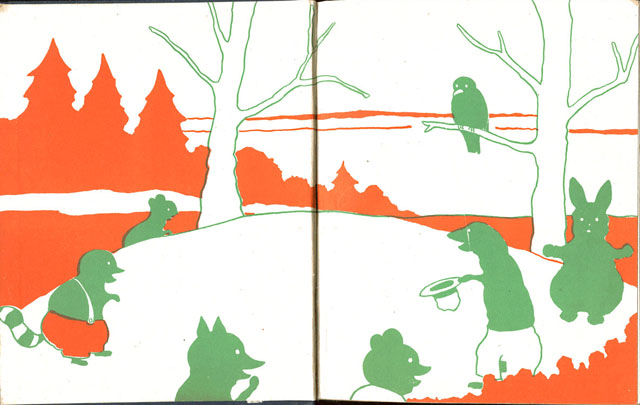 Front endpapers
Front endpapers
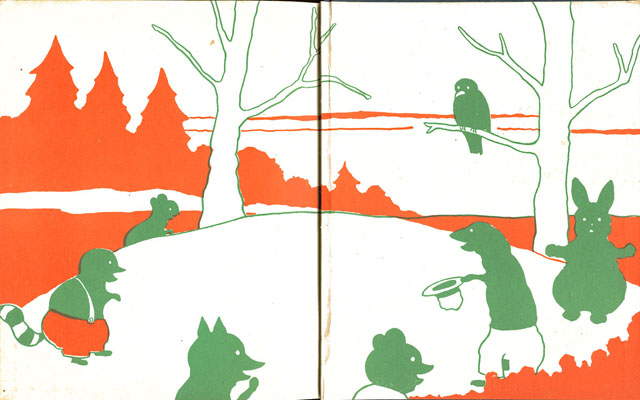 Back endpapers
Back endpapers
End of Project Gutenberg's The Tale of Peter Mink, by Arthur Scott Bailey
*** END OF THIS PROJECT GUTENBERG EBOOK THE TALE OF PETER MINK ***
***** This file should be named 21845-h.htm or 21845-h.zip *****
This and all associated files of various formats will be found in:
http://www.gutenberg.org/2/1/8/4/21845/
Produced by Joe Longo and the Online Distributed
Proofreading Team at http://www.pgdp.net
Updated editions will replace the previous one--the old editions
will be renamed.
Creating the works from public domain print editions means that no
one owns a United States copyright in these works, so the Foundation
(and you!) can copy and distribute it in the United States without
permission and without paying copyright royalties. Special rules,
set forth in the General Terms of Use part of this license, apply to
copying and distributing Project Gutenberg-tm electronic works to
protect the PROJECT GUTENBERG-tm concept and trademark. Project
Gutenberg is a registered trademark, and may not be used if you
charge for the eBooks, unless you receive specific permission. If you
do not charge anything for copies of this eBook, complying with the
rules is very easy. You may use this eBook for nearly any purpose
such as creation of derivative works, reports, performances and
research. They may be modified and printed and given away--you may do
practically ANYTHING with public domain eBooks. Redistribution is
subject to the trademark license, especially commercial
redistribution.
*** START: FULL LICENSE ***
THE FULL PROJECT GUTENBERG LICENSE
PLEASE READ THIS BEFORE YOU DISTRIBUTE OR USE THIS WORK
To protect the Project Gutenberg-tm mission of promoting the free
distribution of electronic works, by using or distributing this work
(or any other work associated in any way with the phrase "Project
Gutenberg"), you agree to comply with all the terms of the Full Project
Gutenberg-tm License (available with this file or online at
http://gutenberg.org/license).
Section 1. General Terms of Use and Redistributing Project Gutenberg-tm
electronic works
1.A. By reading or using any part of this Project Gutenberg-tm
electronic work, you indicate that you have read, understand, agree to
and accept all the terms of this license and intellectual property
(trademark/copyright) agreement. If you do not agree to abide by all
the terms of this agreement, you must cease using and return or destroy
all copies of Project Gutenberg-tm electronic works in your possession.
If you paid a fee for obtaining a copy of or access to a Project
Gutenberg-tm electronic work and you do not agree to be bound by the
terms of this agreement, you may obtain a refund from the person or
entity to whom you paid the fee as set forth in paragraph 1.E.8.
1.B. "Project Gutenberg" is a registered trademark. It may only be
used on or associated in any way with an electronic work by people who
agree to be bound by the terms of this agreement. There are a few
things that you can do with most Project Gutenberg-tm electronic works
even without complying with the full terms of this agreement. See
paragraph 1.C below. There are a lot of things you can do with Project
Gutenberg-tm electronic works if you follow the terms of this agreement
and help preserve free future access to Project Gutenberg-tm electronic
works. See paragraph 1.E below.
1.C. The Project Gutenberg Literary Archive Foundation ("the Foundation"
or PGLAF), owns a compilation copyright in the collection of Project
Gutenberg-tm electronic works. Nearly all the individual works in the
collection are in the public domain in the United States. If an
individual work is in the public domain in the United States and you are
located in the United States, we do not claim a right to prevent you from
copying, distributing, performing, displaying or creating derivative
works based on the work as long as all references to Project Gutenberg
are removed. Of course, we hope that you will support the Project
Gutenberg-tm mission of promoting free access to electronic works by
freely sharing Project Gutenberg-tm works in compliance with the terms of
this agreement for keeping the Project Gutenberg-tm name associated with
the work. You can easily comply with the terms of this agreement by
keeping this work in the same format with its attached full Project
Gutenberg-tm License when you share it without charge with others.
1.D. The copyright laws of the place where you are located also govern
what you can do with this work. Copyright laws in most countries are in
a constant state of change. If you are outside the United States, check
the laws of your country in addition to the terms of this agreement
before downloading, copying, displaying, performing, distributing or
creating derivative works based on this work or any other Project
Gutenberg-tm work. The Foundation makes no representations concerning
the copyright status of any work in any country outside the United
States.
1.E. Unless you have removed all references to Project Gutenberg:
1.E.1. The following sentence, with active links to, or other immediate
access to, the full Project Gutenberg-tm License must appear prominently
whenever any copy of a Project Gutenberg-tm work (any work on which the
phrase "Project Gutenberg" appears, or with which the phrase "Project
Gutenberg" is associated) is accessed, displayed, performed, viewed,
copied or distributed:
This eBook is for the use of anyone anywhere at no cost and with
almost no restrictions whatsoever. You may copy it, give it away or
re-use it under the terms of the Project Gutenberg License included
with this eBook or online at www.gutenberg.org
1.E.2. If an individual Project Gutenberg-tm electronic work is derived
from the public domain (does not contain a notice indicating that it is
posted with permission of the copyright holder), the work can be copied
and distributed to anyone in the United States without paying any fees
or charges. If you are redistributing or providing access to a work
with the phrase "Project Gutenberg" associated with or appearing on the
work, you must comply either with the requirements of paragraphs 1.E.1
through 1.E.7 or obtain permission for the use of the work and the
Project Gutenberg-tm trademark as set forth in paragraphs 1.E.8 or
1.E.9.
1.E.3. If an individual Project Gutenberg-tm electronic work is posted
with the permission of the copyright holder, your use and distribution
must comply with both paragraphs 1.E.1 through 1.E.7 and any additional
terms imposed by the copyright holder. Additional terms will be linked
to the Project Gutenberg-tm License for all works posted with the
permission of the copyright holder found at the beginning of this work.
1.E.4. Do not unlink or detach or remove the full Project Gutenberg-tm
License terms from this work, or any files containing a part of this
work or any other work associated with Project Gutenberg-tm.
1.E.5. Do not copy, display, perform, distribute or redistribute this
electronic work, or any part of this electronic work, without
prominently displaying the sentence set forth in paragraph 1.E.1 with
active links or immediate access to the full terms of the Project
Gutenberg-tm License.
1.E.6. You may convert to and distribute this work in any binary,
compressed, marked up, nonproprietary or proprietary form, including any
word processing or hypertext form. However, if you provide access to or
distribute copies of a Project Gutenberg-tm work in a format other than
"Plain Vanilla ASCII" or other format used in the official version
posted on the official Project Gutenberg-tm web site (www.gutenberg.org),
you must, at no additional cost, fee or expense to the user, provide a
copy, a means of exporting a copy, or a means of obtaining a copy upon
request, of the work in its original "Plain Vanilla ASCII" or other
form. Any alternate format must include the full Project Gutenberg-tm
License as specified in paragraph 1.E.1.
1.E.7. Do not charge a fee for access to, viewing, displaying,
performing, copying or distributing any Project Gutenberg-tm works
unless you comply with paragraph 1.E.8 or 1.E.9.
1.E.8. You may charge a reasonable fee for copies of or providing
access to or distributing Project Gutenberg-tm electronic works provided
that
- You pay a royalty fee of 20% of the gross profits you derive from
the use of Project Gutenberg-tm works calculated using the method
you already use to calculate your applicable taxes. The fee is
owed to the owner of the Project Gutenberg-tm trademark, but he
has agreed to donate royalties under this paragraph to the
Project Gutenberg Literary Archive Foundation. Royalty payments
must be paid within 60 days following each date on which you
prepare (or are legally required to prepare) your periodic tax
returns. Royalty payments should be clearly marked as such and
sent to the Project Gutenberg Literary Archive Foundation at the
address specified in Section 4, "Information about donations to
the Project Gutenberg Literary Archive Foundation."
- You provide a full refund of any money paid by a user who notifies
you in writing (or by e-mail) within 30 days of receipt that s/he
does not agree to the terms of the full Project Gutenberg-tm
License. You must require such a user to return or
destroy all copies of the works possessed in a physical medium
and discontinue all use of and all access to other copies of
Project Gutenberg-tm works.
- You provide, in accordance with paragraph 1.F.3, a full refund of any
money paid for a work or a replacement copy, if a defect in the
electronic work is discovered and reported to you within 90 days
of receipt of the work.
- You comply with all other terms of this agreement for free
distribution of Project Gutenberg-tm works.
1.E.9. If you wish to charge a fee or distribute a Project Gutenberg-tm
electronic work or group of works on different terms than are set
forth in this agreement, you must obtain permission in writing from
both the Project Gutenberg Literary Archive Foundation and Michael
Hart, the owner of the Project Gutenberg-tm trademark. Contact the
Foundation as set forth in Section 3 below.
1.F.
1.F.1. Project Gutenberg volunteers and employees expend considerable
effort to identify, do copyright research on, transcribe and proofread
public domain works in creating the Project Gutenberg-tm
collection. Despite these efforts, Project Gutenberg-tm electronic
works, and the medium on which they may be stored, may contain
"Defects," such as, but not limited to, incomplete, inaccurate or
corrupt data, transcription errors, a copyright or other intellectual
property infringement, a defective or damaged disk or other medium, a
computer virus, or computer codes that damage or cannot be read by
your equipment.
1.F.2. LIMITED WARRANTY, DISCLAIMER OF DAMAGES - Except for the "Right
of Replacement or Refund" described in paragraph 1.F.3, the Project
Gutenberg Literary Archive Foundation, the owner of the Project
Gutenberg-tm trademark, and any other party distributing a Project
Gutenberg-tm electronic work under this agreement, disclaim all
liability to you for damages, costs and expenses, including legal
fees. YOU AGREE THAT YOU HAVE NO REMEDIES FOR NEGLIGENCE, STRICT
LIABILITY, BREACH OF WARRANTY OR BREACH OF CONTRACT EXCEPT THOSE
PROVIDED IN PARAGRAPH F3. YOU AGREE THAT THE FOUNDATION, THE
TRADEMARK OWNER, AND ANY DISTRIBUTOR UNDER THIS AGREEMENT WILL NOT BE
LIABLE TO YOU FOR ACTUAL, DIRECT, INDIRECT, CONSEQUENTIAL, PUNITIVE OR
INCIDENTAL DAMAGES EVEN IF YOU GIVE NOTICE OF THE POSSIBILITY OF SUCH
DAMAGE.
1.F.3. LIMITED RIGHT OF REPLACEMENT OR REFUND - If you discover a
defect in this electronic work within 90 days of receiving it, you can
receive a refund of the money (if any) you paid for it by sending a
written explanation to the person you received the work from. If you
received the work on a physical medium, you must return the medium with
your written explanation. The person or entity that provided you with
the defective work may elect to provide a replacement copy in lieu of a
refund. If you received the work electronically, the person or entity
providing it to you may choose to give you a second opportunity to
receive the work electronically in lieu of a refund. If the second copy
is also defective, you may demand a refund in writing without further
opportunities to fix the problem.
1.F.4. Except for the limited right of replacement or refund set forth
in paragraph 1.F.3, this work is provided to you 'AS-IS' WITH NO OTHER
WARRANTIES OF ANY KIND, EXPRESS OR IMPLIED, INCLUDING BUT NOT LIMITED TO
WARRANTIES OF MERCHANTIBILITY OR FITNESS FOR ANY PURPOSE.
1.F.5. Some states do not allow disclaimers of certain implied
warranties or the exclusion or limitation of certain types of damages.
If any disclaimer or limitation set forth in this agreement violates the
law of the state applicable to this agreement, the agreement shall be
interpreted to make the maximum disclaimer or limitation permitted by
the applicable state law. The invalidity or unenforceability of any
provision of this agreement shall not void the remaining provisions.
1.F.6. INDEMNITY - You agree to indemnify and hold the Foundation, the
trademark owner, any agent or employee of the Foundation, anyone
providing copies of Project Gutenberg-tm electronic works in accordance
with this agreement, and any volunteers associated with the production,
promotion and distribution of Project Gutenberg-tm electronic works,
harmless from all liability, costs and expenses, including legal fees,
that arise directly or indirectly from any of the following which you do
or cause to occur: (a) distribution of this or any Project Gutenberg-tm
work, (b) alteration, modification, or additions or deletions to any
Project Gutenberg-tm work, and (c) any Defect you cause.
Section 2. Information about the Mission of Project Gutenberg-tm
Project Gutenberg-tm is synonymous with the free distribution of
electronic works in formats readable by the widest variety of computers
including obsolete, old, middle-aged and new computers. It exists
because of the efforts of hundreds of volunteers and donations from
people in all walks of life.
Volunteers and financial support to provide volunteers with the
assistance they need, is critical to reaching Project Gutenberg-tm's
goals and ensuring that the Project Gutenberg-tm collection will
remain freely available for generations to come. In 2001, the Project
Gutenberg Literary Archive Foundation was created to provide a secure
and permanent future for Project Gutenberg-tm and future generations.
To learn more about the Project Gutenberg Literary Archive Foundation
and how your efforts and donations can help, see Sections 3 and 4
and the Foundation web page at http://www.pglaf.org.
Section 3. Information about the Project Gutenberg Literary Archive
Foundation
The Project Gutenberg Literary Archive Foundation is a non profit
501(c)(3) educational corporation organized under the laws of the
state of Mississippi and granted tax exempt status by the Internal
Revenue Service. The Foundation's EIN or federal tax identification
number is 64-6221541. Its 501(c)(3) letter is posted at
http://pglaf.org/fundraising. Contributions to the Project Gutenberg
Literary Archive Foundation are tax deductible to the full extent
permitted by U.S. federal laws and your state's laws.
The Foundation's principal office is located at 4557 Melan Dr. S.
Fairbanks, AK, 99712., but its volunteers and employees are scattered
throughout numerous locations. Its business office is located at
809 North 1500 West, Salt Lake City, UT 84116, (801) 596-1887, email
business@pglaf.org. Email contact links and up to date contact
information can be found at the Foundation's web site and official
page at http://pglaf.org
For additional contact information:
Dr. Gregory B. Newby
Chief Executive and Director
gbnewby@pglaf.org
Section 4. Information about Donations to the Project Gutenberg
Literary Archive Foundation
Project Gutenberg-tm depends upon and cannot survive without wide
spread public support and donations to carry out its mission of
increasing the number of public domain and licensed works that can be
freely distributed in machine readable form accessible by the widest
array of equipment including outdated equipment. Many small donations
($1 to $5,000) are particularly important to maintaining tax exempt
status with the IRS.
The Foundation is committed to complying with the laws regulating
charities and charitable donations in all 50 states of the United
States. Compliance requirements are not uniform and it takes a
considerable effort, much paperwork and many fees to meet and keep up
with these requirements. We do not solicit donations in locations
where we have not received written confirmation of compliance. To
SEND DONATIONS or determine the status of compliance for any
particular state visit http://pglaf.org
While we cannot and do not solicit contributions from states where we
have not met the solicitation requirements, we know of no prohibition
against accepting unsolicited donations from donors in such states who
approach us with offers to donate.
International donations are gratefully accepted, but we cannot make
any statements concerning tax treatment of donations received from
outside the United States. U.S. laws alone swamp our small staff.
Please check the Project Gutenberg Web pages for current donation
methods and addresses. Donations are accepted in a number of other
ways including checks, online payments and credit card donations.
To donate, please visit: http://pglaf.org/donate
Section 5. General Information About Project Gutenberg-tm electronic
works.
Professor Michael S. Hart is the originator of the Project Gutenberg-tm
concept of a library of electronic works that could be freely shared
with anyone. For thirty years, he produced and distributed Project
Gutenberg-tm eBooks with only a loose network of volunteer support.
Project Gutenberg-tm eBooks are often created from several printed
editions, all of which are confirmed as Public Domain in the U.S.
unless a copyright notice is included. Thus, we do not necessarily
keep eBooks in compliance with any particular paper edition.
Most people start at our Web site which has the main PG search facility:
http://www.gutenberg.org
This Web site includes information about Project Gutenberg-tm,
including how to make donations to the Project Gutenberg Literary
Archive Foundation, how to help produce our new eBooks, and how to
subscribe to our email newsletter to hear about new eBooks.
